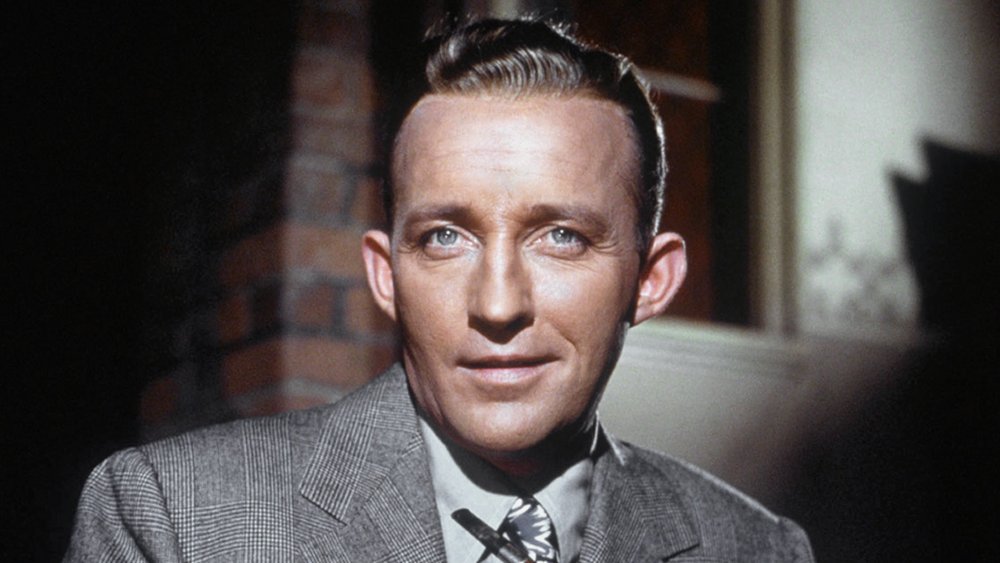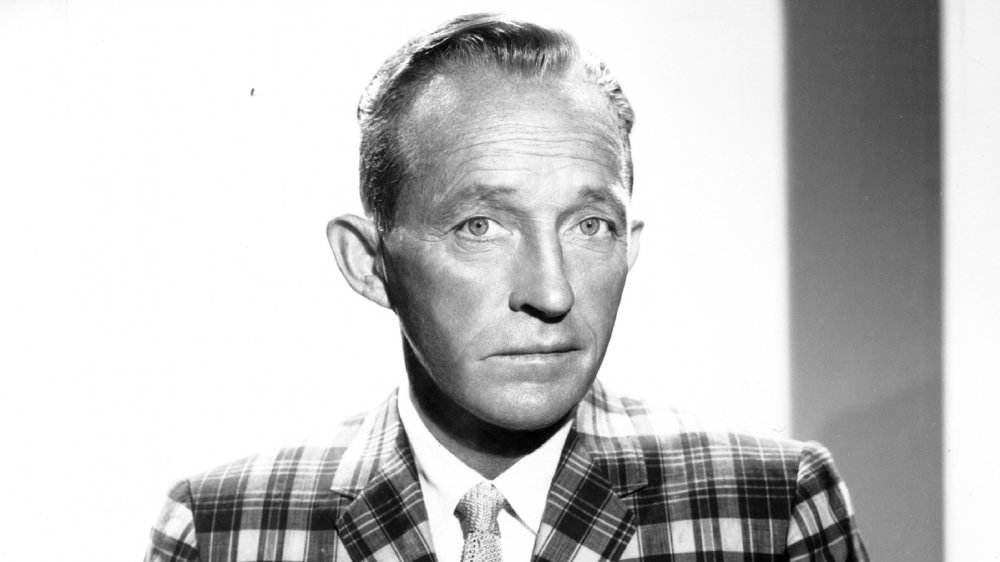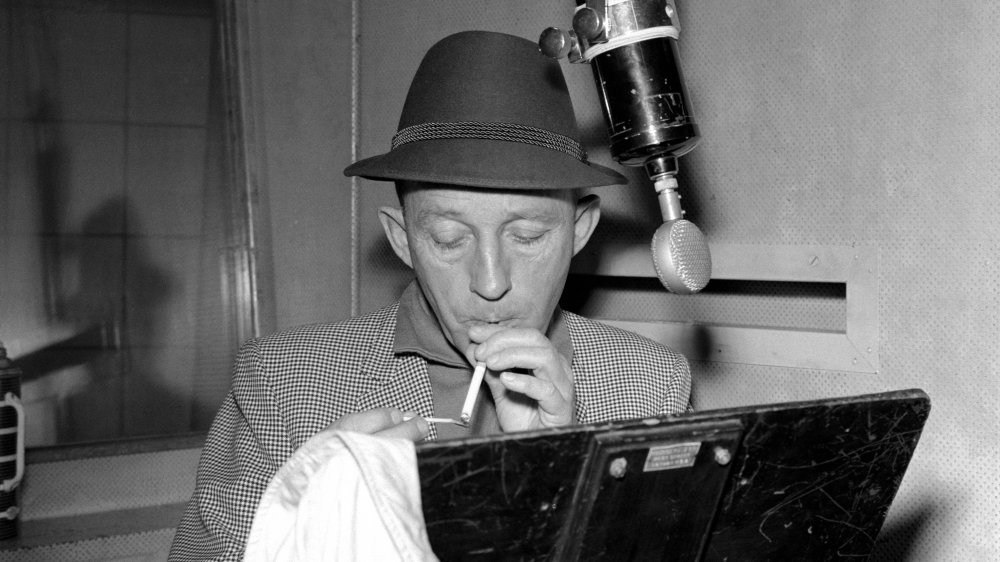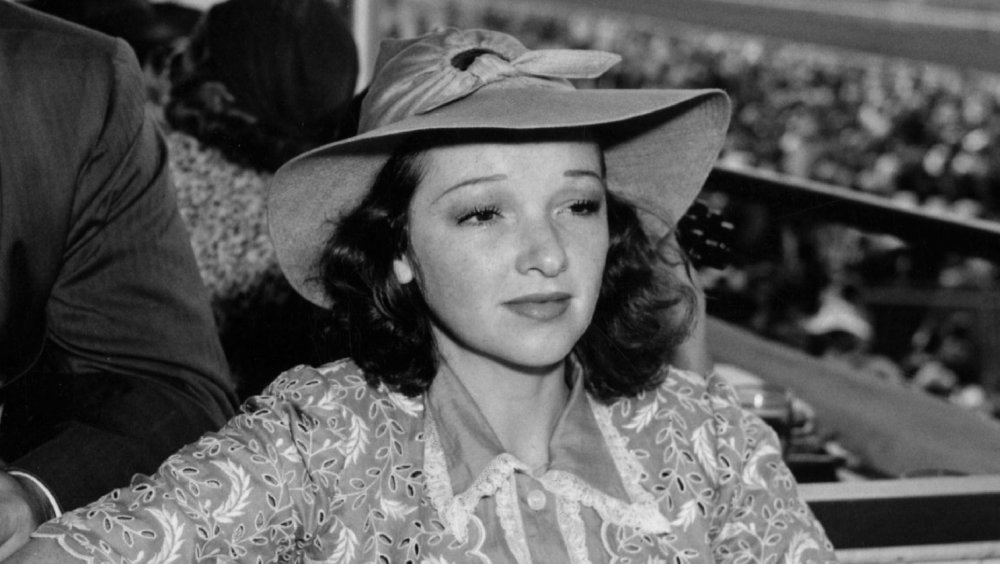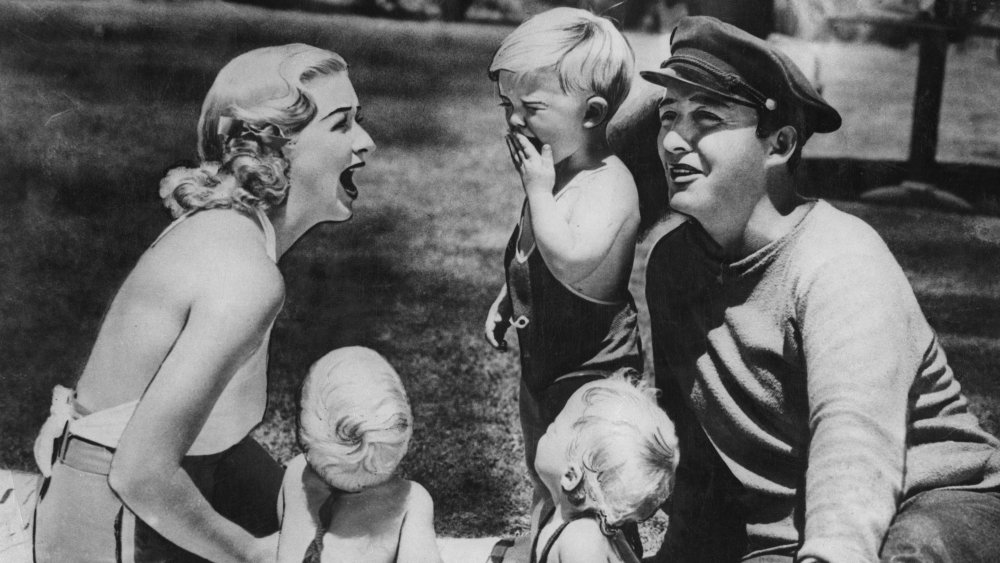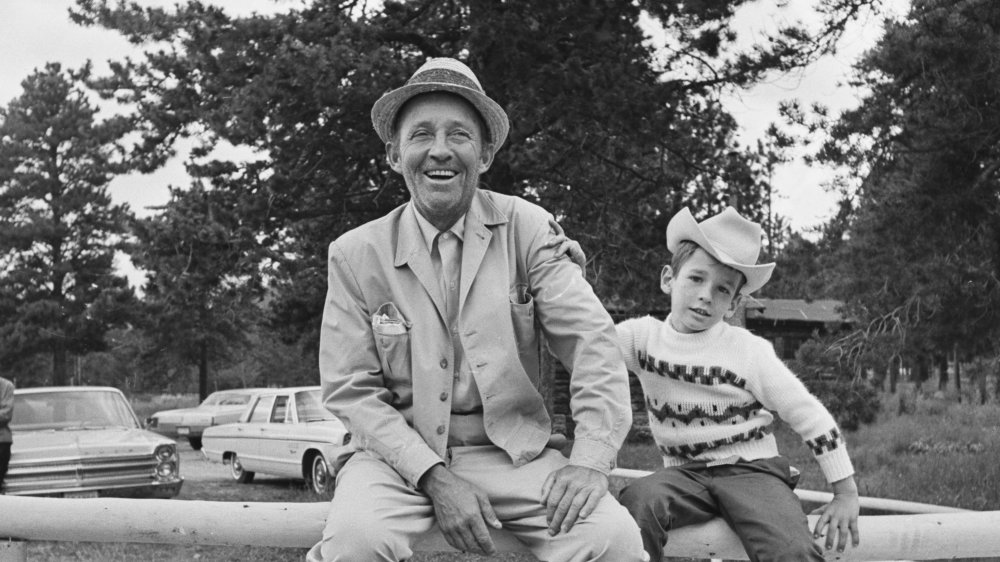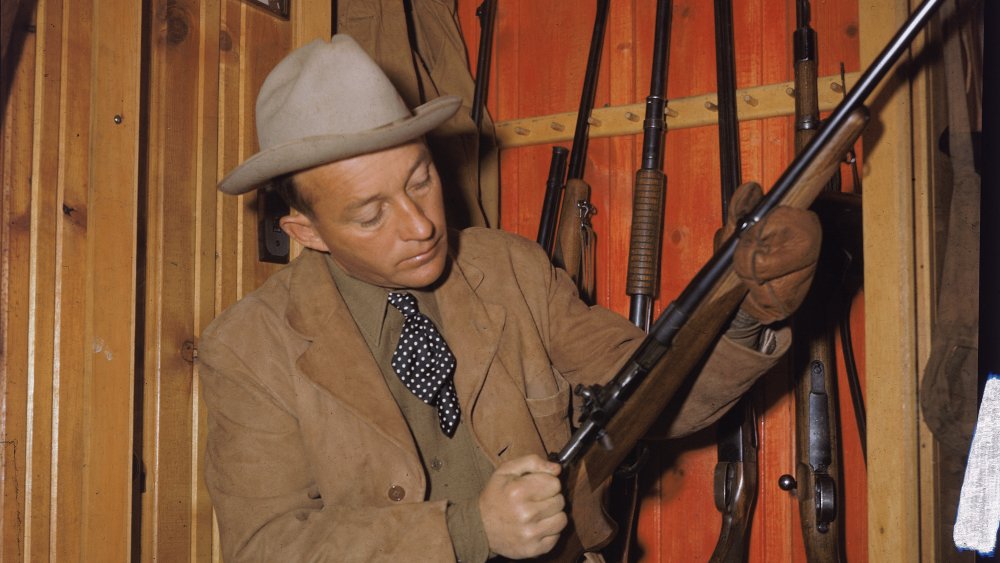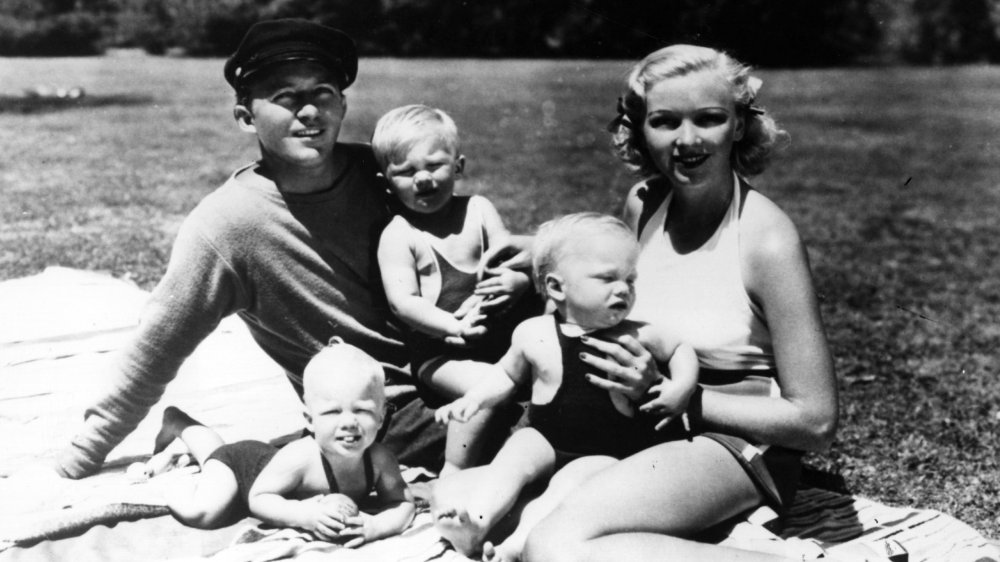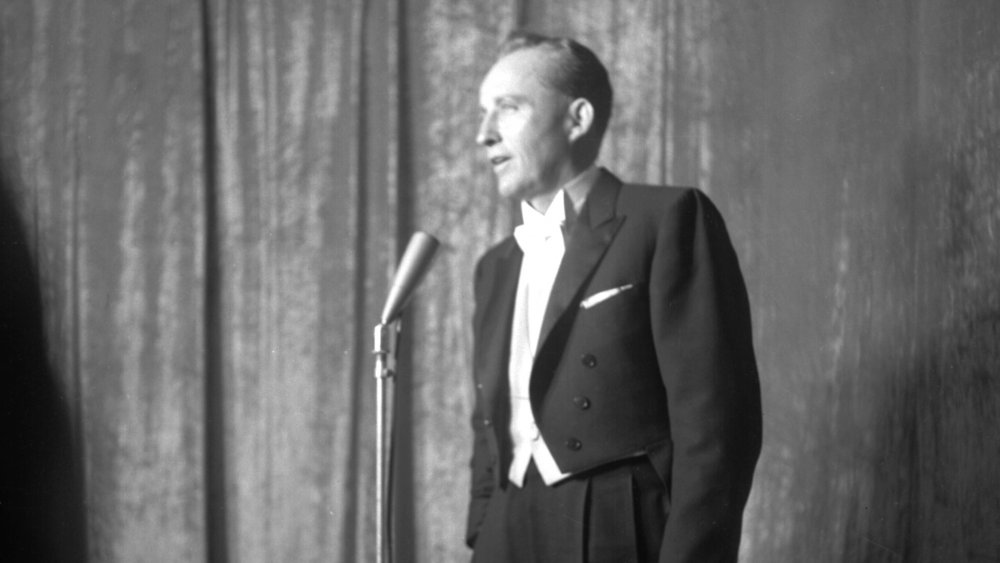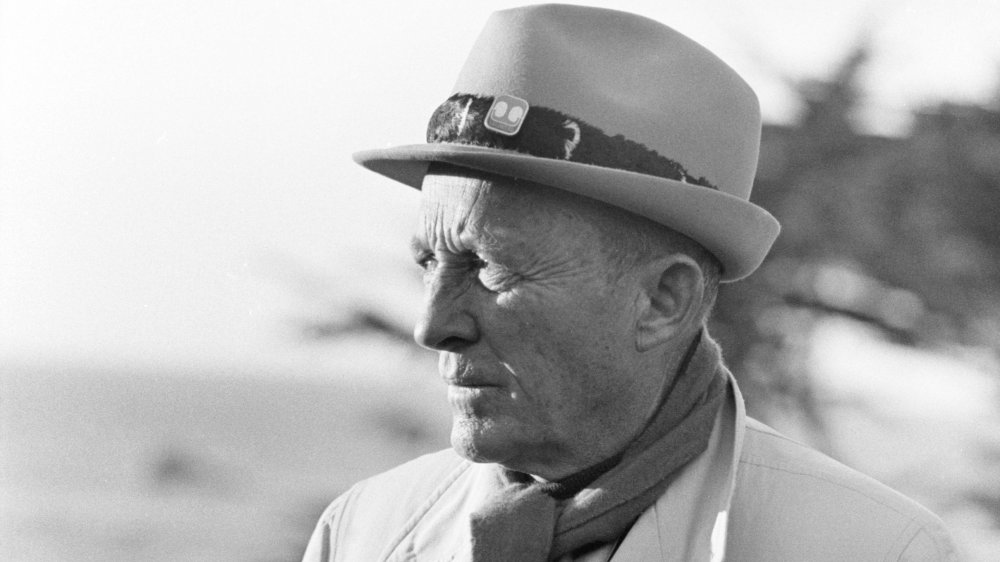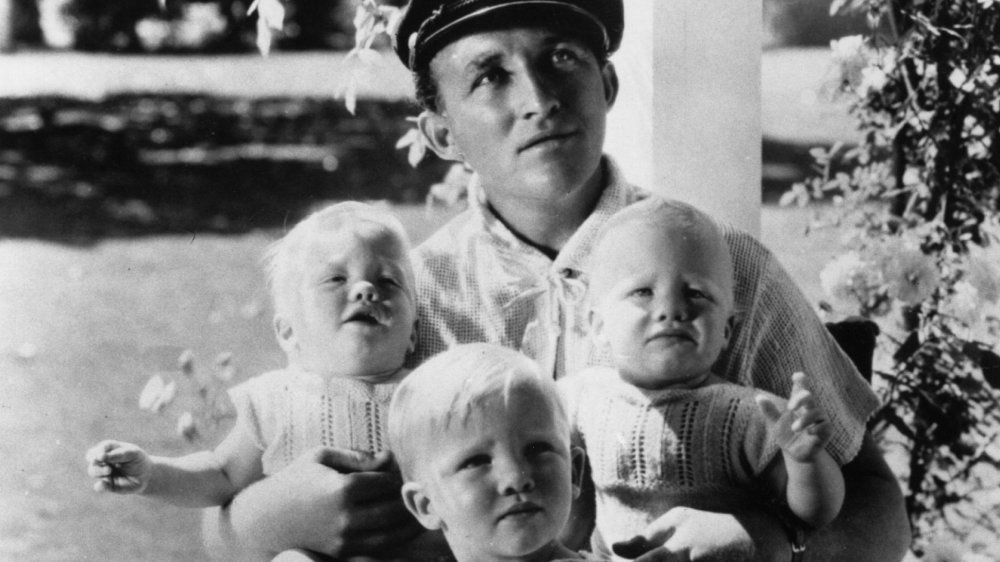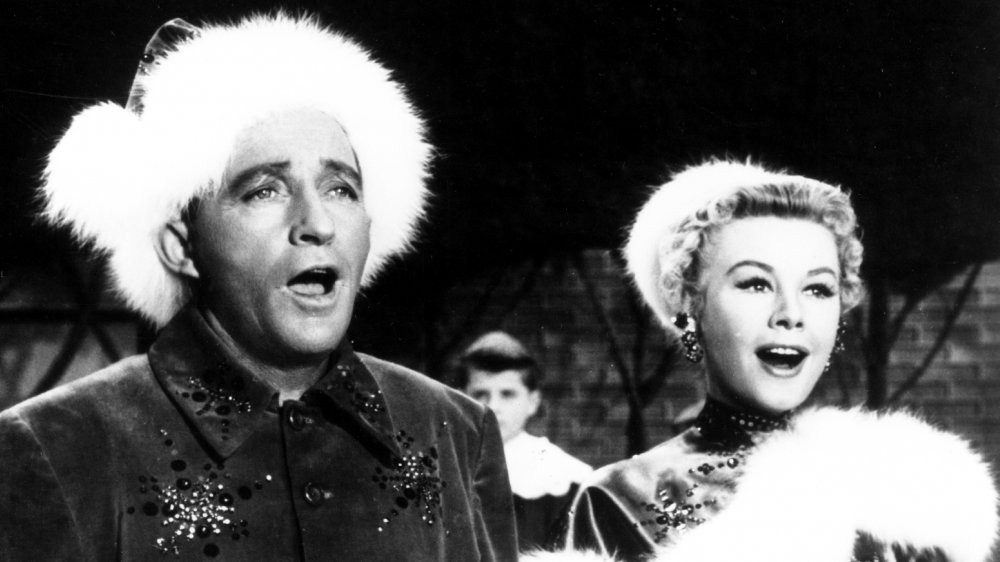The Tragic Real-Life Story Of Bing Crosby
Bing Crosby has gone down in history as one of America's most beloved entertainers. Dominating the silver screen, music charts, and infiltrating radios across the country from the 1930s to 1960s, Crosby remains a pop culture icon. As Robert Trachtenberg, director of American Masters: Bing Crosby Rediscovered, declared in 2016, "It's an unprecedented career in the history of show business," adding, "He really was the first multimedia star of the 20th century" (via Fox News).
Born in Tacoma, Washington, in 1903, Bing Crosby was the fourth of his family's seven children. According to Biography, the future crooner's love for music became apparent at age six — with the purchase of his first phonograph. Leading a normal, middle-class life, by the time he was in university, Crosby "abandoned his aspirations to become a lawyer for his dreams of musical stardom." By 1930, he scored his first film role in King of Jazz and shortly after launched his own radio show — one which attracted "as many as 50 million listeners during its peak."
Yet despite all his success that followed, Crosby's personal life was filled with hardship. The public saw him as the A-list golden boy who topped the musical charts with "nearly 300 hit singles" throughout his career, yet the notoriously private celeb's life was, at times, in shambles. Let's discover the tragic real-life story of Bing Crosby.
Did laryngitis help or hinder Bing Crosby's career?
Bing Crosby's early career in the mid-1920s saw him performing with a musical trio called The Rhythm Boys. It's during this time that Crosby's love for jazz took center stage and showcased his "scat-singing" skills and "jazz-style phrasing" (via Biography). By the time Crosby hit it big in the early 1930s, copycat Crosbys had begun appearing, from Perry Como to Dean Martin. As Commentary reveals, one musician said at the time, "All the singers tried to be Crosbys. You were either a high Crosby or a low Crosby."
However, while the iconic crooner was rising to the top, he was dealt a blow that almost derailed everything: a battle with laryngitis. Listening to Bing Crosby's early records of the '20s and '30s "reveal a hoarseness ... an unmistakable sign of strain." His troubles resulted in a node on one of his vocal cords in 1931, and while doctors told Crosby to rest, the star refused, and instead "kept on singing — and drinking to excess, thereby doing further damage."
Around the mid-1930s, Crosby's voice became lower, losing his high notes and abandoning his scat-style jazz sound. Instead, the singer focused on ballads that were more suited for mass appeal and, in turn, he became "the voice of the nation." That being said, his popularity only damaged his life at home.
A fire destroyed '13 years of marriage'
The early years of Bing Crosby's career were filled with success — and love. According to the Los Angeles Times, the singer met his biggest flame, Dixie Lee, in 1929, with the starlet already a rising actress in her own right at Fox Studios. The pair tied the knot on September 29, 1930, with Lee resigning from her career as a silver screen icon in order to start a family with Crosby. They settled in Toluca Lake, Los Angeles, in 1936, snagging a beautiful estate which sprawled across four acres.
Unfortunately for the Crosbys and their four sons, tragedy struck in 1943, when a fire destroyed their home and "most of the personal possessions the couple had collected of 13 years of marriage went with it." As The New York Times published after the disaster, the $250,000 fire occurred in early January, after Lee and the kids "were taking down Christmas tree decorations," resulting in a short circuit that ignited the tree. Damages were catastrophic, destroying Crosby's "horse racing and golf trophies ... [and] his prized collection of musical recordings."
Thankfully for the star, there was one small silver lining: he managed to salvage "a charred sports shoe from the remains of his dressing room," which miraculously still contained an unharmed $2,000 of "cash race earnings" (via Los Angeles Times).
Dixie Lee was an alcoholic
Although Dixie Lee was once an entertainer herself, her relationship with the spotlight was much more complex and destructive than Bing Crosby's. As revealed in Bing Crosby: Crooner of the Century, Lee didn't solely duck out of the spotlight in order to propel her husband's career further — she did it "because she was uncomfortable in front of the camera or an audience."
As it turned out, leaving the limelight wasn't all the former starlet needed. "My mother was the kind of person who needed to hear, 'Sweetheart, darling, I love you,' and he just couldn't do it," recalled Gary Crosby in his memoir, Going My Own Way (via People). Avoiding her husband's invitations to join him on movie sets or parties, Gary further revealed, "I think she got lonely because Dad was working all the time."
While Bing Crosby managed to kick his alcohol addiction to the curb after marrying Dixie Lee, his wife found solace in the bottle. "It got so that she didn't leave the house and she would pass out and the kids would come home," detailed Bing's daughter, Mary Crosby, in 2014 PBS documentary, American Masters: Bing Crosby Rediscovered. "She'd be, you know, on the floor, and I think that's permanently scarring on just about every level for anybody."
His twin sons may have suffered from fetal alcohol syndrome
Sadly, Dixie Lee's alcohol abuse didn't only have lasting impacts on herself. Along with the psychological hardships she most likely gave her children and Bing Crosby himself, it also had physical consequences for the couple's two twin sons, Dennis and Phillip Crosby.
As American Masters: Bing Crosby Rediscovered revealed, the twin Crosby brothers "were victims of fetal alcohol syndrome." Heartbreakingly enough, because the issue wasn't discussed at the time, neither Lee or Bing knew how to help their children. "The twins, they didn't look quite right," the documentary's director, Robert Trachtenberg, told People, adding that he took photos of Dennis and Phillip to experts at USC. "[I]t affects their skull and their nose, and it manifests itself physically as well. The specialists looked at them and said 'Yeah, this is like a textbook case of fetal alcohol syndrome.'"
Eventually, all of Bing's sons from his marriage to Lee became alcoholics, and by the time Dennis was 56, he had committed suicide from a self-inflicted gunshot wound. "When my mother died, I saw the light go out of his eyes," recalled his brother, Gary Crosby, at Dennis' memorial service (via Washington Post). "As far as I'm concerned, he's been trying to get back to her ever since."
If you or anyone you know is having suicidal thoughts, please call the National Suicide Prevention Lifeline at 1-800-273-TALK (8255).
Bing Crosby was an absentee father
Considering Bing Crosby started a family with Dixie Lee right as he solidified himself on the A-list, the star was often away from home. It's something that the "White Christmas" crooner admitted near the end of his life, as well. Speaking with Barbara Walters in 1977, Bing explained, "When the four boys were growing up, I was very busy, making three, four pictures a year, had the radio [show], and records, and they were in boarding schools."
If that's not all, Crosby also seems to have been obsessed with the idea that his children would grow up corrupted — the norm with celebrity tots. As his son Gary Crosby once revealed (via American Masters: Bing Crosby Rediscovered), "He always said he didn't want any Hollywood kids in the house ... He was frightened to death that we were going to become what his idea of rich kids were." But Bing's obsession only pushed the boys away.
It's only during Bing's second marriage to wife Kathryn Grant that he finally kicked his paternal instincts up a notch. "As far as raising kids, he didn't have a clue," the singer's youngest son, Nathaniel Crosby, confirmed to The Express. "I can't say what happened with my father's first family. I believe he had more time to spend with us as his career was less of a priority later in life."
Was Bing Crosby a dysfunctional father, too?
Throughout his career, Bing Crosby presented an idyllic image of himself to the masses. "Everyone in the world was in love with Bing Crosby," mused the singer's second wife, Kathryn Crosby, in an interview for American Masters: Bing Crosby Rediscovered. If you weren't obsessed with Bing at the time, the other perception was that he was an "ultra-square pop crooner" (via The Baltimore Sun). Regardless of which side you were on, one thing was for certain: Bing Crosby was harmless.
After Bing's death in 1977, his public persona was dealt a massive blow after his eldest son, Gary Crosby, published a memoir in 1983, Going My Own Way, detailing his father's abusive tendencies. As American Masters revealed, it would "forever tarnish the public's perception of Crosby." While Gary's brother, Phillip, denied the intensity of such claims, Gary would stick to his narrative for years to come, even revealing in 1987, "As far back as I can remember in my lifetime, the earliest childhood memory that I have, I don't remember a time when terror, bewilderment, and anxiety and despair weren't on my shoulders constantly."
The Baltimore Sun notes that, while some stars, such as Elvis (who passed away the same year as Bing Crosby), "evolved into [a] posthumous life," Bing, instead, was buried in pop culture history, with his son's claims "sort of [cutting] him off at the knees."
His son, Lindsay Crosby, may have hated him
When Bing Crosby's son, Gary Crosby, published his harrowing memoir, Going My Own Way, in 1983, the A-list crooner wasn't alive to witness the following blow: his son, Lindsay Crosby, sided with his brother, confirming the allegations. As People revealed at the time, Lindsay's "endorsement [was] surprising: By most accounts, he was Bing's favorite of the four."
When their father was still alive and the boys were already adults, it looks like Bing put time and energy into trying to make sure his sons didn't go astray. In fact, according to American Masters: Bing Crosby Rediscovered, while Lindsay was struggling with alcohol and depression, Bing considered placing him in a psychiatric ward, concerned for his son's health. "There were decades of clean up," mused Bing's daughter, Mary Crosby, in the documentary.
Ultimately, it looks like Lindsay rejected Bing's pleas for help and, sadly, could not get healthy after his father's passing in 1977, either. In December of 1989, Lindsay committed suicide after learning the family inheritance he had was gone. As Marilyn Reiss, a representative for Gary Crosby told the Los Angeles Times, the youngest of Bing and Dixie Lee's children battled alcoholism and depression for years, along with "the strain of living under the shadow of his famous father."
If you or anyone you know is having suicidal thoughts, please call the National Suicide Prevention Lifeline at 1-800-273-TALK (8255).
Bing Crosby lost the love of his life
After years of loneliness coupled with decades of alcohol abuse, Bing Crosby's wife, Dixie Lee, was diagnosed with ovarian cancer in June of 1952 — at the age of 40. Even more tragic was Bing's absence when his wife passed that same year. As American Masters: Bing Crosby Rediscovered revealed, Lee's doctors decided not to let her know the cancer was terminal, and her husband jet off to Paris for a scheduled movie shoot — so as to not raise suspicion anything was wrong.
Considering Bing Crosby was such a star, the singer didn't even have peace on the day of his wife's funeral. "It was a freaking circus," Gary Crosby said in an archival interview (via American Masters), detailing the overwhelming number of photographers. "Through it all ... it was like he was alone."
In an ironic twist of fate, Dixie Lee's passing brought the family closer together — if only for a brief period of time. Per People's feature on Gary's memoir, Going My Own Way, her death "resulted in a rare moment of togetherness." As for Bing, the crooner has been quoted as saying: "I will never talk about my grief at losing her. I believe grief is the most private emotion a human being can have, and I'm going to keep mine that way" (via Bing Crosby: Crooner of the Century).
Bing Crosby almost had an early death
As the years went by and the world changed sonically, Bing Crosby suddenly wasn't the hottest act in Hollywood. Instead, he ducked from center stage and let younger acts take over, such as The Beatles or Elvis Presley. "[Elvis] was the first rock'n'roll star," wrote Pop Cult: Religion and Popular Music, adding that while teenage audiences adored the "King," critics deemed him "too sexual" — a stark contrast from Crosby's cookie-cutter image.
Nevertheless, the crooner was still respected by his audience and peers — save for David Bowie, who declared he was only doing a TV Christmas special with the legend in 1977 "because [his] mother loves Bing Crosby."
That same year, the music industry honored Crosby with a live, televised special "celebrating his 50 years in show business" (via Bing Crosby: Crooner of the Century). The star — who was already in his early 70s — fell off the stage at the end of his performance, grabbing onto a piece of scenery and breaking his fall. Rupturing a disc, Crosby was unable to stand or walk for over a month. "It should have killed him," his daughter, Mary Crosby, revealed to American Masters: Bing Crosby Rediscovered. "It didn't, but it should've."
Bing Crosby never ended up telling his sons he loved them
Gary Crosby wrote his scathing memoir in 1983, detailing the allegedly horrific household the Crosby brothers grew up in. While some family members — such as Bing Crosby's brother, Bob, and Gary's younger brother, Phillip — denied the claims, one thing was for sure: the iconic singer had trouble expressing his emotions. This fact is something Barbara Walters touched upon, too, during her 1977 interview with Bing, revealing that the public sometimes saw "this picture of a man who finds it very hard to give or receive emotion."
Bing shrugged off these allegations, calling himself a "surface fella," yet his second wife, Kathryn, can attest to her late husband's stoic nature. "He started shaking hands with Harry [Crosby] when Harry was four," she recalled to American Masters: Bing Crosby Rediscovered. "I said, 'What are you doing ... you hug him.'"
It looks like Kathryn's words didn't change Bing's personality –even on the day he died on a golf course in October 1977. Speaking with The Express, his youngest son, Nathaniel, recalled being with his father during his final moments after he suffered a heart attack. "His last words weren't particularly memorable," said Nathaniel, adding that even then, his father didn't tell him he loved him. "He said, 'That was a great game of golf, fellas.'"
Has 'White Christmas' overshadowed Bing Crosby's legacy?
Throughout Bing Crosby's lengthy career, the legendary crooner made a whopping 1,200 tunes. As American Masters: Bing Crosby Rediscovered notes, the star covered "every class of song. From hymns and spirituals to Hawaiian, Irish, French, light opera, and R&B." Crosby's biggest hit, however? The holiday classic "White Christmas."
Bing Crosby first recorded the track in May 1942, with the Belleville News-Democrat claiming that its estimated sales were around "50 million copies worldwide." Then "White Christmas" found its way into the first-ever Guinness Book of World Records in 1955 as the "Best-Selling Single" of all time — holding that title for decades to come.
Although Crosby's legacy remains, has his impressive career been overshadowed by a gimmicky holiday song? Some seem to think so. As record producer Ken Barnes so succinctly put it in American Masters, "History doesn't see Bing [as a trailblazer]. History sees him as the guy who comes out every year and sings, 'White Christmas.'" In 1977, Barbara Walters pressed to find out if Crosby was "sick" of his own Christmas classic. "No, I could never be sick of it," the singer revealed, sheepishly adding, "I just fear that people would be sick of it." We're certain that Bing Crosby would find solace in the fact that his Christmas gift just keeps on giving.
